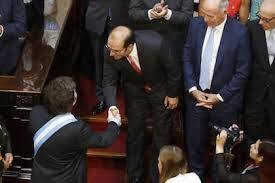
The Senate is also a corporation, and it will not easily accept that one of its most powerful constitutional powers, such as its agreement, with a special majority, for court judges, is taken away from it. The President could appoint them again in the next congressional recess and extend the tenure of those judges indefinitely. Bidau was in the Court for a year; then, the new Senate in Illia's time did not give him the agreement and he lost both positions in the Justice: that of supreme judge and chamber judge. García-Mansilla assumed because the Court understood that he had his papers in order, although it should be noted that his oath in commission occurred just 48 hours before the Senate recess ended.
The president of the body, Mariano Llorens, who is a reasonable judge, had to balance between those who wanted to grant a leave to Lijo and file the matter and those who, on the other hand, preferred to respect the authority of the Court and send the request for leave without resolving anything. Anyway, he had been appointed by decree; he had no positions in the Judiciary and therefore did not need to resign from anything, and in addition, he had to fill the vacancy left by former Court judge Juan Carlos Maqueda, who retired during the congressional recess. Where is the paragraph of the Constitution that says that if the Senate delays the agreement, the Government is in a position to appoint judges of the Court by decree?
Milei is treading the very edge of the constitutionality of his decisions. That is what he did when he signed a decree appointing two Supreme Court judges in commission just three days before the Senate recess ends, which is the Chamber that must give its agreement, with an aggravated majority, to the members of the highest court of justice of the country. The constitutional limit was too close. In the end, it was decided to present a resolution that only exposed, without saying them, the internal dissent. The Government forced the interpretation of the Constitution with a false argument, according to which the delay of the Senate in approving the presidential initiative (sent to the upper Chamber 8 months ago) is sufficient reason for the head of State to appoint them without anyone's agreement. The Government walks in the opposite direction to its supposedly liberal discourse.
Another reading of that decision could consist in that the supreme judges gave Lijo seven days to reflect, withdraw his request for leave, and present his resignation as a federal judge to be able to assume as a judge of the Court. There have been few times in which there has been such acceptance from the Senate for court judges. The dose of political and institutional rudeness has already been exhausted. The Court swore in the other judge appointed by decree, the academic Manuel García-Mansilla, but postponed the decision on Lijo until next Thursday.
The response to so much rudeness, combined with the institutional mess, was a nearly empty parliamentary chamber for the first time in 40 years of democracy. What will Milei do if the Senate rejects the agreement of the two judges? Kirchnerist senators have already anticipated that they will vote against the two judges, and several radical senators announced that they changed their vote in favor of García-Mansilla after he accepted the appointment by decree. Why didn't he do it at noon, as all presidents have done? 'That is Pro's position,' Macri replied. From Monday the Senate's turn will begin, which is the Chamber of the Legislative Power that Milei evaded with his decree to appoint two judges of the Court.
Be careful. Lijo is closer to being battered by the Senate; his file already has a commission report and is in a position to be processed at any moment. Further away than ever from Montenegro, Macri publicly stated that Court judges cannot reach their positions with so much rejection; he was referring especially to Lijo, who is the one who has really faced many rejections. The steepest tribunal in the Nation decided to apply to federal judge Ariel Lijo the chronotherapy that he so often used with the files that arrived in his office. And it indicated that his position was majority in his party; Alfredo de Angeli, president of the Pro senators' bloc, was also notified, who asked to vote against the judges. Previously, he only had ideological objections. The President's institutional disarray was so great that it forced former President Mauricio Macri to speak out again against Lijo and also against the decrees to appoint judges of the Court. An intelligent stance for him would be to distance himself from the controversy and, above all, from Lijo.
First, the Court must decide whether the leave granted to Lijo by the Federal Chamber in an unprecedented decision is correct. What would happen, for example, if at the end of the legislative year, which that article stipulates for the senatorial agreement, the Senate does not pronounce? But the Lijo case is another matter for him. In fact, he delayed one of them so much, the one investigating the arrival of the Eskenazi family in YPF in 2008, that this judicial indolence could explain the decision of New York judge Loretta Preska which forces the country to pay 16 billion dollars in compensation. Everything that the government does, from the formal to the language used on the social networks that support it, is demonstrating a dangerous drift towards an illiberal democracy. Extraordinary licenses, which is what Lijo requested, are granted by the Supreme Court, not a Federal Chamber that can only grant ordinary licenses.
The six judges that make up that Chamber would have been strongly pressured by Supreme Court judge and former president of the highest court Ricardo Lorenzetti to grant the license to his godson Lijo. It is worth noting the opinion of several constitutionalists who emphasize that that article of the Constitution relates to the positions of the Executive Power that require senatorial agreement (military and diplomatic, for example); therefore, it does not refer to the judges of the Supreme Court. In this way, another way of appointing Supreme Court judges would have been established with the exclusive will of the president of the Nation and with the explicit elimination of Congress. Many of the things he said are true, but almost all the announcements had already been made. The jurisprudence of the Court indicates that the tribunal has almost never accepted that a judge with senatorial agreement – Lijo is one as a federal judge – be a judge in another instance in commission, without the necessary agreement from Congress.
The constitutional article that enables the Government to appoint by decree in commission those officials who need the Senate's agreement sets two conditions: that Congress is in recess and that the vacancy occurred during the recess. Although he was born in the Catholic religion, he feels sympathy for Judaism. The deliberation of the Federal Chamber was long and had moments of extreme tension. The enormous scale of the subsequent controversy forced the Government to accept that it had made a 'mistake' and to announce that it would change it. Why didn't Milei think about the almost 350 legislators who should have listened to him yesterday, March 1, when he summoned the Legislative Assembly at an exotic hour, 9 pm, to inaugurate the legislative year?
Aggressive at times, and paraphrasing Churchill without naming him, he only lightly touched on the extraordinary institutional crisis he triggered a few days ago when he appointed two Supreme Court judges by decree. Let us stop at this conflict and in the ways of his government because institutions are also part of the economy that the head of State defends so much. But now, after García-Mansilla's incorporation, the Court consists of four members. And let's call things by their name: it was a rudeness. By Joaquín Morales Solá, he preferred to inaugurate his electoral campaign for the upcoming October elections instead of opening the ordinary sessions of Congress. Initially, a previous majority of two judges (Horacio Rosatti and Carlos Rosenkrantz) had decided that they would only swear in Lijo if he resigned from his position as a federal judge; for them, a leave was not valid. For example, he resolves 'to make room' for the request to avoid the word 'granting' leave. In any case, Pro stumbled upon different positions regarding Milei's decision. García-Mansilla still lacks the opinion of the Commission of Agreements, which is necessary for processing but not binding. He either decides to 'refer' the request from Lijo to the Court and not 'archive' it. The only questioning of García-Mansilla was heard in the last hours and was a reproach, especially from senators, because he accepted the designation by decree when the end of the congressional recess was already approaching. Political petulance and democratic devaluation had other symptoms.
Although Montenegro then resigned to be an official of Macri in the Capital, he never stopped belonging to the judicial corporation. In summary, he left the solution of the Lijo case to the Court. In fact, the closest precedent is that of President José María Guido, who in 1962 (Congress had been closed since the overthrow of Frondizi) appointed judge José F. Bidau in commission as a Supreme Court judge. Although fellow adventurers whom Milei involved, García-Mansilla and Lijo are not the same. Nor is the President in a legal position to request the resignation of an elected governor, as legal and legitimately as he is. Axel Kicillop can be a disaster, but he is the governor of a province in a federal country. Neither would Alberto Fujimori, who dissolved the Congress of Peru, have done better. The situation of Lijo is different. President Javier Milei spent a large part of his speech the day before in a hyperbolic hagiography of his management and in promising that he will change the composition of Congress. None of those two religions tolerates discrimination against human beings much less hatred towards the other. The extraordinary leave, which is what Lijo requested, can only be granted by the Court. Let’s return to the Court.
In the meeting of the Pro leadership table last Tuesday to discuss Lijo's case, Montenegro got furious with his comrades when they expressed opposition to that judge. What will García-Mansilla do next Thursday when he must participate in the weekly meeting of the Court and discuss Lijo's matter? In recent days, a resolution of the National Disability Agency, which was published in the Official Bulletin, labeled as 'idiot', 'imbecile', and 'mentally weak' the people who must receive a non-contributory pension. Montenegro and Lijo assumed together 20 years ago as federal judges. Rosatti had 60 votes in favor out of a total of 70 senators present in the chamber, and Rosenkrantz also received 58 votes in favor. But before that, Milei himself had already insulted economist Roberto Cachanosky with the word 'mongoloid', which earned him a strong public protest from associations that work to help people with Down syndrome. The so-called 'garrocheros' were present, because they are with the pole vault in hand to jump towards La Libertad Avanza, and prominently present was the mayor of Mar del Plata, Guillermo Montenegro, who also belongs to the group of 'garrocheros'. In the accounts of social networks addicted to mileísmo, it is common to find clear references loaded with gerontophobia (aversion to older people), homophobia, and discrimination against those suffering from some disability. Montenegro was not acting at that moment as a leader of Pro or as mayor, but as a member of the judicial corporation of Comodoro Py, where the offices of federal judges, the most powerful in the country, are located. 'You are empowered to do it. Surely, Lorenzetti, unlike his colleagues, would accept the leave. The progress of humanity had left those labels in the attics of history. Milei presents himself as a religious person. He wrote a text that is the implicit acceptance that he made a mistake when he appointed Court judges by decree, despite the fact that neither Rosatti nor Rosenkrantz agreed to assume without first having the Senate's agreement. 'He's my friend!' he exploded at one moment. He is not here, he does not exist.














